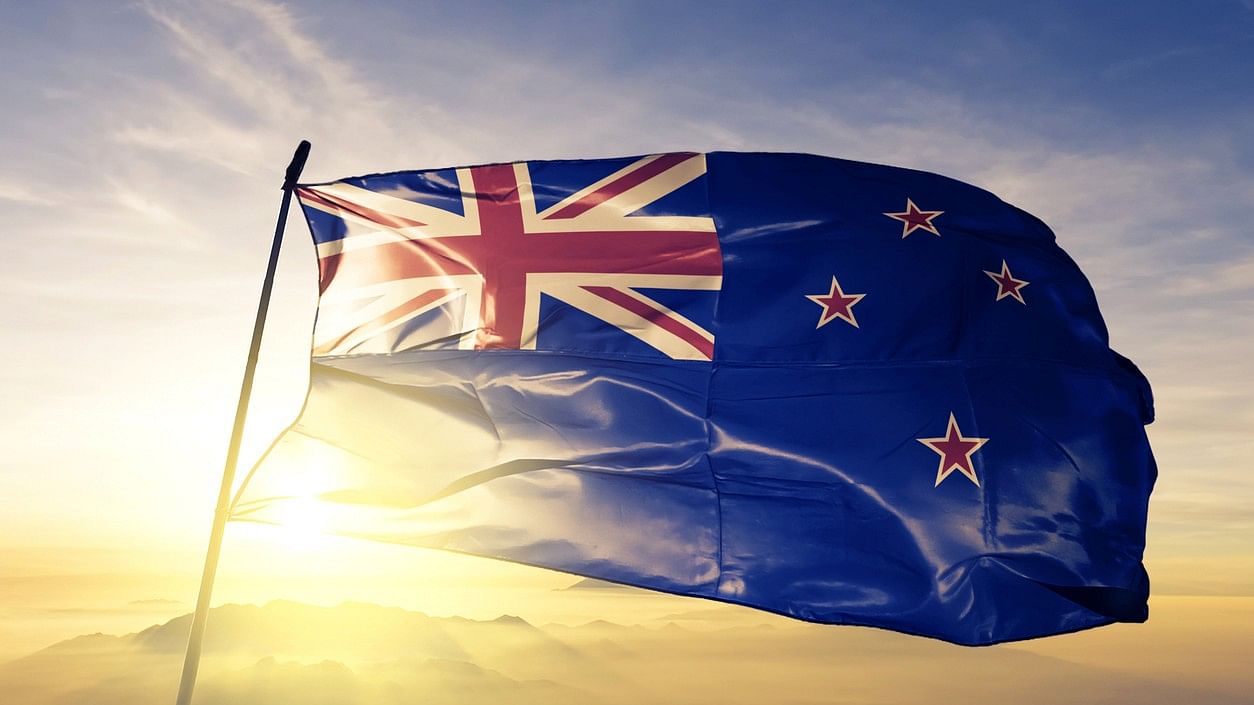
New Zealand's national flag.
Credit: iStock Photo
By Karishma Vaswani
New Zealand’s Treaty of Waitangi — which upholds Māori rights over their land — has long been seen as an important precedent in the global fight for recognition of First Nations people.
That’s now under threat from a draft law that seeks to redefine the principles of the 1840 agreement between hundreds of Māori chiefs and the British Crown. The divisive move drew tens of thousands of protestors outside Parliament in Wellington on Tuesday in one of the largest demonstrations in the nation’s history. Even 184 years later, the shadow of the Empire still hangs over the former colony.
Although it’s unlikely to ever become law — Prime Minister Christopher Luxon’s National Party has said it won’t support the bill beyond the first reading which it already passed — it has brought an ugly side of Kiwi life to the surface: race politics. The leader’s party sits in a conservative-coalition, joined by the right-of-center ACT Party and the New Zealand Party. To get ACT’s support, Luxon agreed to allow the bill to be deliberated, acknowledging internal debate had caused “tension.”
The Māori aren’t sitting by quietly. In scenes that have now gone viral across the world, Māori MP Hana-Rāwhiti Maipi-Clarke led her colleagues in a haka, a traditional Māori dance performed in battles and ceremonies that’s been made famous by the All Blacks rugby team. It brought Parliament to a halt on Nov. 14, briefly stopping members from voting on the Treaty Principles Bill, which is now open for public submissions.
The controversy over one of the nation’s founding documents touches a raw nerve. The agreement has two versions, one in English and the other in Māori, leaving the two sides with differing interpretations about what it means in practice for indigenous rights. The confusing arrangement put much of the power in the hands of the Crown. By the mid-20th century, Māori owned only a fraction of their original land. Just like colonized First Nations populations elsewhere, they became marginalized minorities in their own country.
Some redress was granted in the 1960s and 70s under a reparations tribunal, and as the treaty’s core values were gradually incorporated into national laws. As a result, indigenous communities in New Zealand are mostly better off than their Australian, Canadian and US counterparts, with more representation in government and public life. But this progress risks being undone. Luxon’s new center-right coalition government, which took office in 2023, has unwound some of the policies that gave the community prominence.
A Guardian investigation in July revealed the effect of legislative and policy changes in six key areas, ranging from health, treaty and language, justice, social and housing, to environment and education, that experts say will adversely impact Māori and may deepen existing inequalities. The administration also plans to wind back world-leading anti-smoking laws that would have made it illegal for anyone born after 2008 to buy cigarettes — a decision experts say will affect the community more because of higher smoking rates than other New Zealanders.
Māori make up roughly 20 per cent of New Zealand’s 5 million people but are worse off in comparison to fellow citizens. They’re jailed in much higher numbers, accounting for more than half of the people in prison, and are disproportionately represented in crime and poverty statistics. The community also fares badly when it comes to life expectancy rates, with Māori males at the bottom of the table.
Despite that, ACT leader David Seymour (who has Māori ancestry) says the community gets greater privileges on the basis of race. He wants to redefine the founding document, and is pushing for “equal rights” for all, contending that special provisions for people based on ethnic origins are divisive.
For some Kiwis, Seymour’s argument may resonate. Perhaps they feel the Māori hold unfair advantage over land claims and fishing rights. For those with no historical context, these perceived privileges chafe.
But Seymour’s assertions are Trumpian in nature, as Sir Ian Taylor, a prominent tech entrepreneur and the founder and managing director of Animation Research, noted in a recent editorial. “Seymour is setting himself up as the victim, the man of the common people,” he writes. “It’s a role he played to perfection on the first reading of his bill, even going as far as suggesting that members of the Māori party threatened to shoot him with their gestures. Ring any bells?”
New Zealanders are right to be wary of these cynical political games. Even if Seymour doesn’t succeed in getting the Treaty renegotiated, he’s ignited an emotive issue that he will use to win support from more conservative voters ahead of elections in 2026.
Education, particularly about the atrocities of the Empire, is one way out. Under the previous government led by Jacinda Ardern, the curriculum was changed to ensure that from 2023, school children would understand colonization’s lasting effects. An honest reckoning is necessary, no matter how uncomfortable. In this way, New Zealand is far ahead of the UK, its former colonial master, which until today struggles to come to terms with the legacy of imperialism.
Discussions about why the Māori are disproportionately represented in poverty and prison metrics also need to take place. None of this is easy, but it could bring to the surface viewpoints that need to be carefully thrashed out, before they’re exploited for political gain. The alternative is an environment where Seymour’s dangerous rhetoric can thrive.
From India to Indonesia, colonial history has been difficult to confront. The debate over indigenous rights shows how deep these old wounds can run. In comparison to their global counterparts, Kiwis are still doing relatively well. It would be a tragedy to lose so much progress.